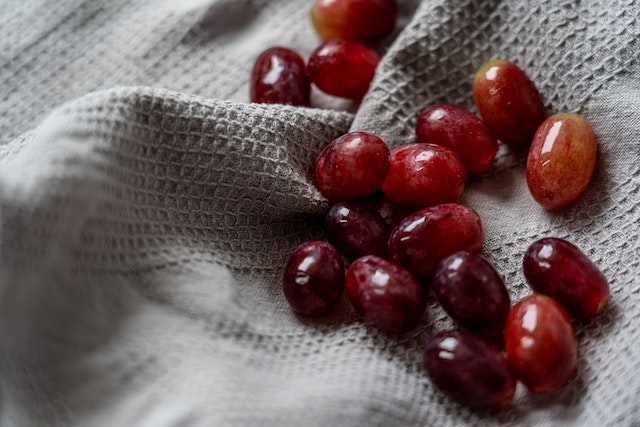Although carbs might cause a rise in blood sugar, the human body needs this essential macronutrient to produce energy. Grapes are an excellent source of carbs for people with diabetes because, in addition to their other health benefits, they are filled with essential micronutrients such as minerals, vitamins, and a range of phytochemicals that fight diseases.

This makes grapes an ideal food choice for diabetics. Grapes and grape products may benefit diabetics in terms of their health due to their low mean glycemic index and glycemic load.
Grapes are technically classified as a kind of berry. They cluster together on the woody vines where they ripen. It is possible that they will be any shade from red to bright green to yellow to black or even purple.
Contents
Seeded or seedless

Grapes come in both seeded and seedless kinds. The antioxidant content of grapes, in particular the antioxidants resveratrol, lutein, and zeaxanthin are responsible for most of the health advantages associated with eating grapes. Grapes have the capacity to fight against illnesses as well as inflammation because of the natural compounds that they contain.
Grape seeds

Grape seeds also have a high concentration of antioxidants; grape seeds are often crushed to remove the oil and produce grape seed extract. The levels of antioxidants found in grape seed extract may be ten to twenty times greater than those found in other fruits.
Grapes are not forbidden for diabetics to consume, despite the fact that there are other fruits that may be preferable. It is important to keep in mind that grapes have many positive effects on health. However, as is the case with the majority of foods, consumption in moderation is essential.
Are grapes good for diabetics?

Grapes are one type of fruit with a low glycemic index, meaning that eating them is less likely to cause a rise in one's blood sugar levels. Other fruits with a high glycemic index should only be consumed in small to average amounts.
To avoid eating an excessive amount of sugar, eating fruits should be reserved for snacking rather than accompanying meals. Fruit juices should be avoided at all costs since they lack the dietary fiber that diabetics need to maintain proper control of their blood glucose levels.
Fruits in their natural, unprocessed state should be consumed by diabetics. The greatest nutritional value may often be found in freshly picked fruits. Fruits that have been processed often have sugar coatings, which are known to be harmful to one's health. Grapes are a versatile fruit that diabetics may enjoy in several ways, making them an excellent option for those with the condition.
Grapes Benefits for People with Diabetes

There is a correlation between eating a diet high in fruits and vegetables and having a lower risk of developing various illnesses, including diabetes, cancer, obesity, and heart disease. Much like other fruits and vegetables, grapes have a good deal of fiber and water in their flesh.
Grapes, especially red grapes, contain a chemical known as resveratrol, which has been linked to various potential health advantages. Grapes may be especially beneficial to your health due to the presence of antioxidants and other nutrients.
Grapes contain significant quantities of several necessary vitamins, minerals, and antioxidants. Grapes are an excellent alternative to other fruits for those who have diabetes due to the high fiber content of the fruit.
Because the body does not absorb it, fiber plays an important role in the preservation of general health. Instead, it travels via the intestines and the stomach to reach its final destination. Fiber is beneficial to people who have diabetes since it helps to:
- reduce the quantity of harmful cholesterol in the body
- restore regularity to the bowel movements
- slows down how much sugar gets into the body
In addition to this, the fiber included in grapes may help those who have diabetes that is connected with obesity. Grapes are a meal that is high in energy but low in calories, so eating them might help you feel fuller for longer. Grapes carry numerous critical vitamins and minerals. Nutrients in grapes include vitamin B2, vitamin B6, vitamin C, vitamin K, potassium, copper, and manganese.
Since they contain a lot of fiber, they are a good fruit choice for diabetics. It is a meal that is high in energy but low in calories, so eating it makes you feel fuller for longer.
A scientific study showed that grape polyphenols have considerable impacts on the level of blood glucose, lipid profile, and blood pressure, in addition to having beneficial effects on the liver and heart that are accomplished via a variety of methods. To be more specific, grape fruit is associated with the following health benefits:
1. Contains Antioxidants

Antioxidants are essential chemicals that protect cells from the damage that is caused by free radicals, which results in oxidative stress. The majority of the antioxidant compounds in grapes are found in the fruit's seeds and skin. Antioxidants are what give numerous types of grapes their distinctive hues and are responsible for the myriad of health advantages associated with grapes. Grapes contain a wide variety of antioxidants, some of which include beta-carotene, resveratrol, anthocyanins, and vitamin C, amongst others.
2. Control blood pressure
Grapes provide 6% of the daily potassium consumption that is recommended for adults (in 151 grams). One of the most important minerals for controlling blood pressure is potassium. Grapes contain potassium, which has been shown to lower blood pressure in the heart's veins, lowering the risk of cardiovascular disease and stroke.
3. Lower blood sugar

A chemical molecule known as resveratrol is credited with the ability to control how the body processes sugar after eating. Grapes are beneficial to diabetics because they contain resveratrol, which enables them to control their blood sugar levels better.
The amount of fructose found in one cup of grapes is 23 grams. Although this may seem like a high number, the glycemic index of one serving of grapes is just 25.4. This is a relatively modest score when compared to the scores of other kinds of fruits. Grapes have a low glycemic index, which makes them a good choice for people with diabetes. Thus, Grapes may help diabetics manage their condition.
Conclusion
Grapes come in a wide variety of colors and shapes, while diabetes is a serious disease that affects millions of people all over the globe. It is a common misconception that people with diabetes should avoid eating fruits due to their amount of sugar, but this is not the case.
However, if you take the necessary safety measures, you should be able to eat the fruits. Grapes are loaded with beneficial components such as flavonoids, resveratrol, and antioxidants like fiber. Consuming grapes regularly may help reduce the risk of cardiovascular disease, high blood pressure, and blood clots.
Grapes, like any other meal that contains carbohydrates, might, however, cause your blood sugar levels to rise, particularly if you eat a considerable number of them. Therefore, when discussing strategies for maintaining a healthy life, portion control is often mentioned as one of the essential components.
Thus, to ensure that you are not put in harm's way, you should only eat in moderation even the healthiest foods, including grapes. In moderate quantities, people who have diabetes may consume them without fear of adverse effects since they are both safe and healthy.





